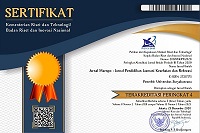Assistance using mobile learning applications to improve skills physical education teacher in the 4.0 era
Abstract
The aim of this research is to evaluate the effectiveness of support in the utilization of mobile learning applications among 38 Physical Education, Sports, and Health Teachers in Lahat Regency. Employing a quantitative descriptive methodology through a survey approach, the research encompasses pre-test and post-test assessments. During the pre-test phase, the results highlight a deficiency in teachers' knowledge regarding mobile learning applications, specifically in comprehending their purpose and operational functionalities. Nonetheless, the post-test outcomes signify a significant enhancement, revealing that the teachers developed awareness and proficiency in utilizing mobile learning applications. They demonstrated an improved understanding of the applications' objectives and acquired the necessary skills for their effective implementation. The transition from the pre-test to the post-test phase signifies the success of the provided assistance in bridging the knowledge gap among the teachers. This implies that the intervention, likely delivered in the form of training or guidance, positively influenced the participants' comprehension and utilization of mobile learning applications. The research findings underscore the critical role of targeted support in augmenting educators' familiarity with technology, ultimately contributing to the seamless integration of mobile learning tools in educational settings. Consequently, this study makes a noteworthy contribution to the ongoing discourse on the significance of mobile applications in pedagogy, particularly within the domain of Physical Education, Sports, and Health.
Key words: mobile learning, physical education, era 4.0.
Full Text:
PDFReferences
Anita, Y., Arwin, A., Ahmad, S., Helsa, Y., & Kenedi, A. K. (2022). Pelatihan Pengembangan Bahan Ajar Digital Berbasis HOTS Sebagai Bentuk Pembelajaran Di Era Revolusi Industri 4.0 Untuk Guru Sekolah Dasar. Dedication : Jurnal Pengabdian Masyarakat, 6(1), 59–68. https://doi.org/10.31537/dedication.v6i1.658
Aryanti, S., & Azhar, S. (2022). Uji Coba Skala Kecil : Implementasi Aplikasi Mobile Learning Materi Bulu Tangkis Small Scale Trials : Implementation of Mobile Learning Applications for Badminton Materials. 11(2), 311–318.
Aryanti, S., Azhar, S., Tangkudung, J., Yusmawati, Ilahi, B. R., & Okilanda, A. (2022). Teaching Games for Understanding (TGfU) Model Learning for Overhead Pass Volleyball in Elementary School Students. International Journal of Human Movement and Sports Sciences, 10(4), 677–682. https://doi.org/10.13189/saj.2022.100407
Hamdan, K., & Ben-Chaban, Y. (2013). An Interactive Mobile Learning Method to Measure Students performance. https://doi.org/10.5339/qproc.2013.mlearn.26
Hasanudin, C., Subyantoro, S., Zulaeha, I., & Pristiwati, R. (2021). Strategi Menyusun Bahan Ajar Inovatif Berbasis Mobile Learning untuk Pembelajaran Mata Kuliah Keterampilan Menulis di Abad 21. Prosiding Seminar Nasional Pascasarjana, 343–347.
Ismaili, J., & Ibrahimi, E. H. O. (2017). Mobile learning as alternative to assistive technology devices for special needs students. Education and Information Technologies, 22(3), 883–899. https://doi.org/10.1007/s10639-015-9462-9
Junanto, T., & Afriani, R. (2016). Implementasi Digital-Age Literacy Dalam Pendidikan Abad 21 Di Indonesia. Prosiding Seminar Nasional Pendidikan Sains, 2016–2113. https://media.neliti.com/media/publications/173402-ID-none.pdf
Lubis M. (2020). Peran Guru Pada Era Pendidikan 4.0. Eduka : Jurnal Pendidikan, Hukum, Dan Bisnis, 4(2).
Mac Callum, K., Jeffrey, L., & NA, K. (2014). Factors Impacting Teachers’ Adoption of Mobile Learning. Journal of Information Technology Education: Research, 13, 141–162. https://doi.org/10.28945/1970
Samsinar, S. (2021). Mobile Learning Dalam Pembelajaran. AL-GURFAH: Journal of Primary Education, 4307(February), 1–5.
Sur, Widiya Astuti Alama, Minhatul Hasanah, and M. R. M. (2020). Analisis Motivasi Belajar Mahasiswa Dengan Sistem Pembelajaran Daring Selama Masa Pandemi Covid-19. Jurnal EQUATION Teori Dan Penelitian Pendidikan Matematikaal, 3(2).
Wahyuningtyas, Dyah Tri, and R. N. S. (2017). Pelatihan Media Pembelajaran Matematika Berdasarkan Kurikulum 2013 Bagi Guru Sekolah Dasar Di Gugus 9 Kecamatan Sukun Malang. Jurnal Dedikasi, 14, 8–11.
Yusnaini dan Slamet. (2019). Era Revolusi Industri 4.0: Tantangan Dan Peluang Dalam Upaya Meningkatkan Literasi Pendidikan. Prosiding Seminar Nasional Pendidikan Program Pascasarjana Universitas Pgri Palembang, 12(01), 1073–85.
CAMPOS, Alline C., et al. Cannabidiol, neuroprotection and neuropsychiatric disorders. Pharmacological research, 2016, 112: 119-127.
DOI: https://doi.org/10.35194/jm.v13i2.3762
Refbacks
- There are currently no refbacks.
Copyright (c) 2023 Jurnal Maenpo : Jurnal Pendidikan Jasmani Kesehatan dan Rekreasi

This work is licensed under a Creative Commons Attribution-ShareAlike 4.0 International License.




1.png)

.png)


.png)





(1)_.png)
_.png)









